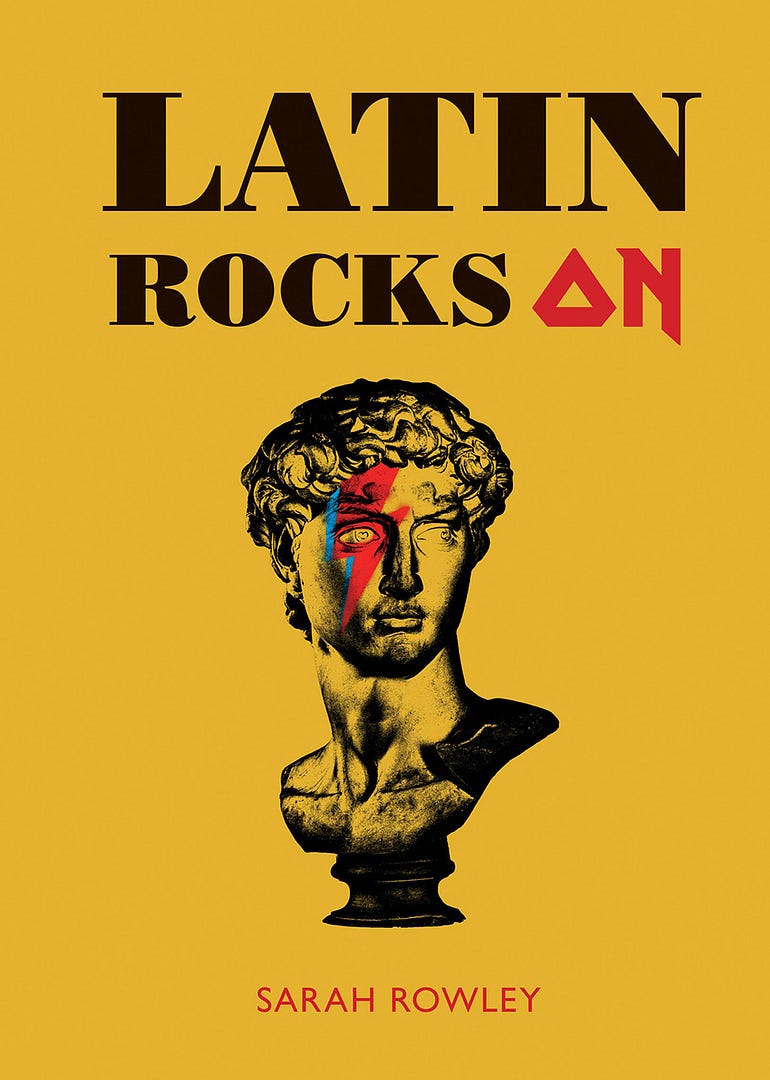Sarah Rowley's Latin Rocks On
A Pleasant, At Times Imperfect, Latin Jaunt Through Pop Music

It’s October, and it’s a worthwhile idea to at least start thinking about appropriate gifts for that Latin teacher you love. Earlier this year Unicorn Press published Latin Rocks On (distributed by the University of Chicago Press), a collection of lines from pop songs translated into Latin, which just might fit the bill.
Unicorn Press boasts on its website that it employs “the very best designers, editors, researchers, photographers, indexers and publicists… to make beautiful books for our global audience to cherish.” It doesn’t appear to be an idle boast — Latin Rocks On is a pretty book, a bright mustard-colored hardback adorned with neat images of classic statuary gussied up in rock regalia (the cover features Michelangelo’s David with David Bowie’s “Aladdin Sane” lightning bolt down half his face). There’s a fabric bookmark bound into the book, always a classy touch. I’ve left the book around the house while my three toddlers run wild, and I can assure you that the book can take a pounding but still look great — it’s well-made.
Its contents consist of individual lines from pop songs, one to three per page, stylishly arranged. There are no complete song translations here, so you can’t use the book as a karaoke songbook. The translations are literal, and are in general not easily singable — there’s minimal effort to link up the Latin with the melody of the song. Hence the Beatles line “baby you can drive my car” becomes “Amicula, permitto tibi vehere meum currum.” Just try singing that. And lots of the Latin is literal translation from English, without regard for idiom or even proper vocabulary. Sometimes, in fact, to be a bit more frank, the Latin is quite bad. Hence the Youssou N’Dour song “7 Seconds” is translated “septem secundis.” I’m sure N’Dour is talking about a moment in time (Latin momentum), not “people/things occupying the position after the first” (secundus). In English though, those two meaning are found in the same word, hence the confusion in the Latin.
So if these aren’t karaoke versions or especially good Latin, what’s the point? The point is the pleasure you get from recognizing something new in ancient Latin garb. This actually is an effective and pleasurable form of humor, unless your pedantry has utterly driven out your capacity to desipere in loco. At spoken Latin events I’ve enjoyed many an absurd laugh over people’s literal Latin versions of modern jargon — I remember one student rendered “never mind” as “numquam mens,” which is such bad Latin I still laugh when I think about it. Part of the effectiveness is that it makes no sense in the target language — when your brain is in Latin mode, it can’t make any sense of numquam mens — and only when you try a totally different mental tool on it, translating it into English (which takes a moment), do you recognize it, which causes a little blip of pleasure.
This pleasure of recognition also operates when the Latin is technically accurate if perhaps not inspired. So when I read “ego non possum vultum meum sentire cum ego sum tecum, sed id amo, sed id amo,” I smile to recognize the song “Can’t Feel My Face” by The Weeknd, whose lyrics in English also make no sense to me (“I can’t feel my face when I’m with you, but I love it”?). “Amorem invenimus in loco exspe” is a nice little exercise for how to say “we found love in a hopeless place.” And “Graecia est quomodo sentimus” is a pun in English translation, and kind of ingenious (“Grease is the way we are feeling” is the original).
In her preface, Rowley reports that at least one teacher would begin classes with these song lines as an opening exercise. I think this would be effective in a grammar-translation class. Students get to translating, and they get a little payoff when done — the pleasure of recognition (presuming they know the original song).
Rowley volunteers for the U.K. organization Classics For All, which has always struck me as a worthy charity. The spirit of that endeavor is palpable in Latin Rocks On, an effort by those who know some Latin to come meet the modern world more than halfway. I find this laudable, and Latin Rocks On is a pleasant little contribution to the effort. If your Latin teacher doesn’t get infuriated by occasional bad Latin, it makes a likely little gift. It’s a good-looking book that is a worth a few smiles, which means something in this world. The last song bit Rowley offers is from the Black-Eyed Peas song “Where Is the Love:”
Deus deus deus — nos adiuva!
Mitte aliquid consilium ex caelo,
Nam homines me cogunt rogare:
Ubi est amor?
If you’re looking for it, there’s at least a little bit of it in this book.
John Byron Kuhner is former president of the North American Institute of Living Latin Studies (SALVI) and editor of In Medias Res.
Sign up to receive email updates about new articles


Comment
Sign in with